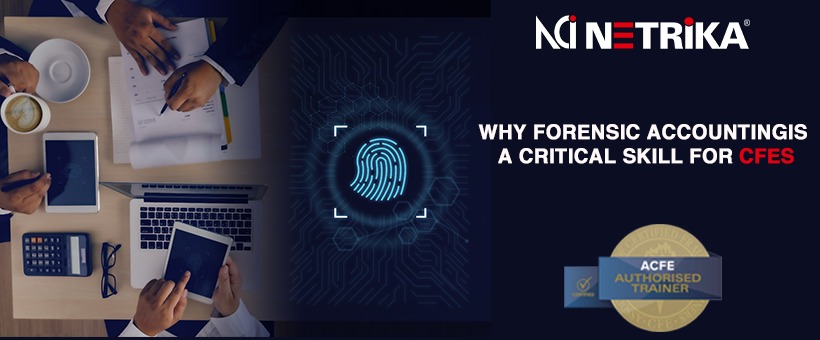News & Events
Why Forensic Accounting is a Critical Skill for CFEs
- July 22, 2024
- Posted by: marketing@netrika.com
- Category: Blogs

Given the increasing number of fraudulent incidents. Cyber, and white-collar crimes across the globe, forensic accounting is gaining prominence within organizations. Forensic accounting encompasses the practice of leveraging auditing and accounting to uncover fraud through strategized investigative techniques. In the wake of the number and intensity of fraudulent incidents, the need for expertise in the area, especially through the lens of a Certified Fraud Examiner has propelled investigations in the right direction.
ACFE (Association of Certified Fraud Examiners) considers forensic accounting as a niche area to uncover corporate frauds, measure resultant damage, and provide litigation support/ outside counsel by applying accounting, and auditing principles for the detection of frauds.
Let us dive deep into why forensic accounting is a critical skill for CFEs
Forensic accounting is conducted to prosecute an individual or a party for fraud, embezzlement, or other financial claims. It amalgamates accounting, auditing, and investigative skills to interpret accounting evidence and apply accounting methods to track and collect forensic evidence. This falls in line with the primary responsibility of a certified fraud examiner to detect, analyze, respond, and mitigate fraudulent incidents through a streamlined and strategic methodology.
Certified fraud examiners integrate forensic accounting into their responsibilities to uncover hidden discrepancies, fraudulent activities, and irregularities. They analyze financial statements, trace funds flow, and identify inconsistencies to meticulously detect fraud through routine financial analysis.
There are multiple tasks that a CFE with forensic accounting skills undertakes, including-
- Fraud detection involves tracking down embezzled money, examining and evaluating financial evidence, and investigating financial fraud.
- Leveraging software to help with the recovery, examination, and presentation of financial evidence is known as computer forensics;
- Assessing internal controls for sufficiency or offering guidance in creating and executing an internal control structure that is in line with an organization’s risk profile
- Participating in court procedures, offering expert witness testimony, and creating visual aids to bolster evidence presented during trial.
In addition to this, forensic accounting provides CFEs with a structured approach to dissecting complex financial data, applying specialized methods, and reconstructing financial events. They also serve as expert witnesses in court cases involving financial fraud and support the legal process with well-documented and credible testimony.
Furthermore, certified fraud examiners assess the effectiveness of financial internal controls and systems within an organization to prevent potential vulnerabilities from being misused by malicious actors. They recommend improvements, conduct thorough investigations, and improve fraud prevention strategies to enable organizations to adapt to emerging fraud techniques.

